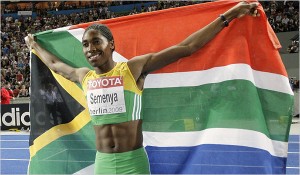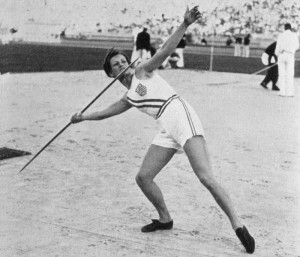Laurie and Debbie say:
(Cross-posted to Body Impolitic.)
Unusualmusic, blogging at The Angry Black Woman, has an excellent initial post on what we expect American women athletes to look like, and live like.
One of the great problems that women athletes face is the idea that women are heterosexual sex objects. And the beauty ideal for these sex objects is a thin shape, with a bit of a curvy shape, (but not too curvy, thats fat), and a distinct lack of muscles. So female athletes are by definition considered deviant. And the more strength and height that their sports require, the more un-feminine, and deviant they are considered.

Meanwhile, the blogosphere has been buzzing with the story of Caster Semenya, South African middle-distance runner who has been forced to take a gender test because her status as a female has been questions. (The International Olympic Committee doesn’t do gender tests any more. But the International Association of Athletics Federations (IAAF) still does.
Unusualmusic’s excellent post sheds a lot of light on the Semenya story.
Basically, there are two points being made “against” Semenya: first, doesn’t look female enough, and second, “her astoundingly quick performance” must be evidence of a lurking Y chromosome somewhere.
What they really mean is what unusualmusic is writing about: we like our women at least a little fragile, at least a little vulnerable. Being blue-eyed and blonde makes a big difference too. We encourage women to be fit and strong, but not too fit, or too strong. Go to the gym, preferably at least three times a week, but pick those workouts so they don’t give you “ugly muscles.” Take up that sport, but don’t get too good at it (we don’t like our women really competitive, either).
unusualmusic quotes from gltbq:
Perhaps the most deep-seated is the fear that women’s athletics might erode traditional femininity. The global sports world registered this concern at least three decades before the institution of sex testing and long before the Renee Richards case.
In the early 1930s, when Mildred “Babe” Didrikson, the greatest woman athlete of modern times, set world records in the woman’s 80-meter hurdles and javelin throw, reporters continually remarked on her masculine appearance, and the press focused on the Olympic medalist in a campaign to restore femininity to athletics.

The controversy finally ended when Didrikson married, started wearing dresses, and turned from competing in track, basketball, baseball, football, and boxing, to setting records in the more acceptably feminine world of golf.
Semenya’s situation is being treated like an isolated case, and a lot of attention is focused on how her fellow athletes react to her: “These kind of people should not run with us,” said Elisa Cusma, the Italian runner who finished 6th.
It’s easy to focus on the extreme cases and miss the trends. If you’re a successful woman in sports, and the press and the audience can accuse you of not being a woman, they will. But if they can’t find ground for that accusation, they’ll accuse you of not being womanly enough.
Women in day-to-day life face a lot of pressure to be the “right kind of women” (i.e., the ones men want). For celebrity women, the heat is turned up a lot … because, of course, celebrity women are the yardstick with which people measure the women they know, the yardstick by which the rules of sexiness, attractiveness, and appropriateness are determined.
unusualmusic’s article is loaded with links that underscore the point. A few women athletes fit into the “sexiness” box, but most of them don’t. Just as most of the rest of us don’t.
It’s been great guest-blogging at Feministe! Come visit us at Body Impolitic.